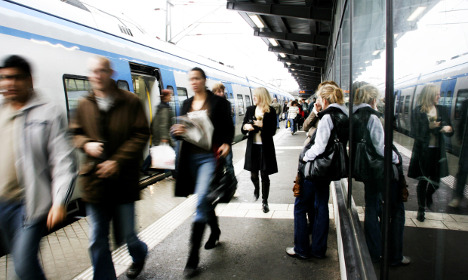The Local's Maddy Savage has been living in Stockholm since September 2014. Photo: Benoit Derrier
FEMINISM
‘Swedes are great friends but terrible strangers’
After eight months of living in Stockholm, The Local's Editor Maddy Savage has embraced the city's nature, eaten her bodyweight in meatballs and made some wonderful friends. But she's not so impressed by the (lack of) kindness of strangers in her adopted city.
Published: 5 May 2015 11:31 CEST
Updated: 28 September 2015 09:24 CEST
Updated: 28 September 2015 09:24 CEST

Ever been offered help on Stockholm's subway? Photo: Melker Dahlstrand/Image Bank Sweden
“Why on earth would you pick Stockholm over London?” Swedes never tire of quizzing me about my decision to relocate to the Swedish capital and I never tire of answering, because the question itself encompasses one of the things I love most about this country: modesty.
The idea that someone from London might choose to move to a nation where temperatures regularly dip well below freezing, entire apartments are the size of the average British bedroom and one beer costs the price of a whole bottle of wine in our supermarkets (yes, we can buy wine in supermarkets), is baffling to most Swedish people I meet.
But to me these issues seem trivial alongside the many fantastic things that you Swedes could spend way more time boasting about (if you were the boasting type).
For a start, there are all your amazing forests, parks and lakes. Stockholm is one of the world’s cleanest, greenest capitals and the chance to live in a global city where could I walk home from work along the waterfront or go hiking 15 minutes from my door was one of the biggest draws for me when accepting a job here.
The way Swedes prioritize leisure time and wellbeing is also a novelty. As a journalist I have to work long and flexible hours, but I am also encouraged to savour my time off – the Swedish way. By contrast, using the phrase “work-life balance” is akin to swearing at many British companies – especially in London – where there’s often an unspoken competition to be the last one in the office each night.
The Local's Maddy Savage has been living in Stockholm since September 2014. Photo: Benoit Derrier
And then there is Sweden’s world famous gender equality, which goes far beyond affordable daycare and paternity leave. I’m still surprised when I see women’s football leading a sports bulletin on television and proud to live in a country where there are four female party leaders in parliament.
Sweden still has work to do to reduce the gender pay gap and achieve more balance in its boardrooms, but it remains streets ahead of most of the EU.
Women also enjoy a huge amount of freedom in their private lives. While I’m only just starting to dip my toe into the dating scene, it’s clear from Swedish friends that sleeping with someone on the first night is far from taboo here. As one guy I quizzed put it: “How can we judge girls who are just behaving in the same way as us. Everyone gets a bit lonely sometimes”. A British male friend laughed out loud when I recounted the conversation. “There are girls you have sex with and girls you want to be your girlfriend,” he said.
READ ALSO: Ten things expat women notice in Sweden
So what sucks about Sweden? For me it can be summarized in one sentence. Swedes make warm and wonderful friends once you get to know them, but they are terrible strangers.
I’ve lost count of the number of times I’ve had doors slammed in my face. No one has ever offered to help me with a heavy bag on the underground (seven people stepped in the last time I visited London). I rarely get more than a “hej” out of my neighbours. An entire supermarket experience can take place in silence.
Some say this is down to a built-in independence and a desire not to make anyone feel uncomfortable. Others argue it’s to do with the harsh climate: “Why make small talk on a street corner when you’re freezing your butt off?” said one Swede I talked to at a party. Yet that doesn’t explain why the chattiest Swedish people I’ve met so far were up north in Umeå.
Whatever the reason, sorry Swedes, your lack of social interaction just makes you seem rude to many foreigners. And while there’s not space here to debate the nation’s immigration policies, I’m pretty sure this behaviour isn’t helping newcomers integrate into society. Well, that and your insistence on talking back in English every time we try to speak in your language.
There is one final problem I have with Sweden. Remember that “trivial” winter weather I mentioned earlier? Well, I wasn’t quite telling the truth. I adore the snow. I can embrace the cold. But the lack of light? Living through one of the darkest Novembers in Swedish history last year was hell on earth.
“You’ve got two options,” advised a fellow expat recently. “Find a ‘sambo’ to help get you through those short days next time, or just copy the Swedes – and book a flight to Thailand”.
A Swedish version of this article was originally published in Sweden's Metro newspaper.
Url copied to clipboard!


 Please whitelist us to continue reading.
Please whitelist us to continue reading.